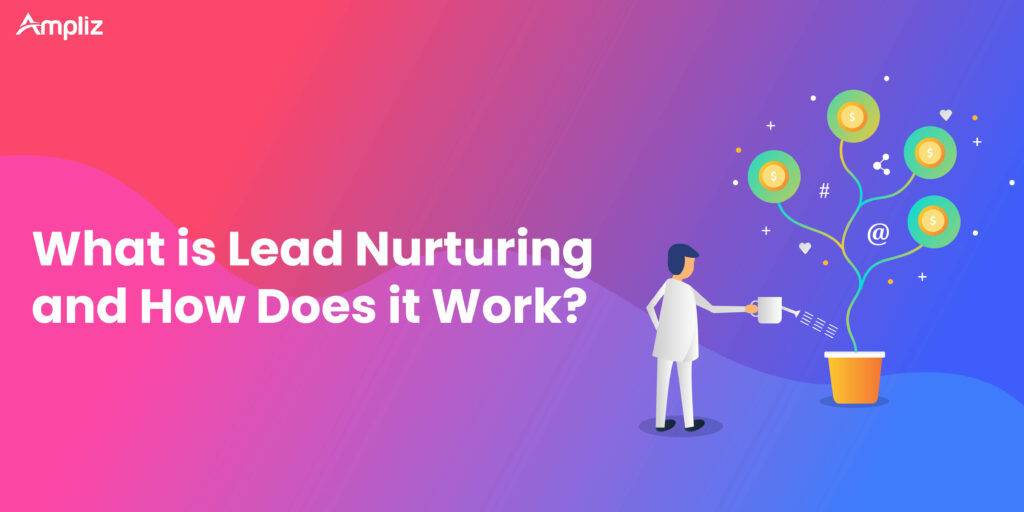Most B2B sales professionals believe that a lead is one of the most important aspects of business development. Almost every sales approach starts after a lead is identified. In an ideal world, a lead will move efficiently through your sales funnel and purchase your product/service. But we don’t live in an ideal world, do we? This is where lead nurturing comes into play.
If you are unaware of the fact that almost every lead needs nurturing, let me walk you through an example. How many times have you visited a website, signed up, browsed, didn’t purchase – and the next day you get flooded with offers from that website? Relatable, right? This example makes lead nurturing look very simple, but it’s not.
What is lead nurturing?
Lead nurturing is the process of fostering a lead throughout the sales process at every stage of the sales funnel in order to generate a sale. Proper nurturing requires targeting a lead at the right place and time with the right offer – resources, discounts, freebies, etc.
Once you understand the problems of a lead and find his/her requirements, you need to provide suggestions or solutions through SMS alerts, SMS marketing, emails, content, etc.
One key thing to take note of here is empathy. Empathy is one of the core skills a marketer should possess, especially while nurturing leads. Identify the pain points of your customer and target them with the right offers – this is how you win at lead nurturing.
Why is lead nurturing important?
A well-crafted lead nurturing strategy should be implemented as it is a key process of acquiring paid customers. There are several benefits of having a lead nurturing steps in your sales process.
- Generate qualified leads
At the first touchpoint, it is very difficult to know the lead and his/her requirements. The lead nurturing process provides the opportunity to know leads’ requirements and make them understand your product. Also, you can figure out if his requirement suits your offering. Once everything goes well and your lead has a proper understanding of your offering, you can consider him/her as a qualified lead upon his/her interest. - A better understanding of leads (Identify Interest or Pain)
Like the above point, the lead nurturing process makes easy to understand a lead properly. Once you start communicating with him/her, you will get to know the pain point and lead’s desired solution. All the emails from your end should have the information that is helpful to the lead and questions for a better understanding.
If you are from the B2B industry, the lead nurturing process will help you understand the lead in terms of employee size, revenue, short & long term targets and their opinion about your competitors. - Easy to segment the leads
There are different types of leads you will encounter on a daily basis. The same type of lead nurturing email will not work for everyone. After knowing his/her intention or interest, you need to segment the leads.
For example, there are two leads clicked on the link you have provided through your email. One clicked and did not spend much time to go through. Another one clicked on the link and spent a long time to understand your product or offer.
In the next step, two different emails should be sent to these leads. Probably, you need to explain in your email what do you offer and how it will be beneficial for him/her while sending an email to former lead. To the latter one, you don’t have to explain your product as s/he has spent enough time to understand. This is how the lead nurturing process helps to segment the leads and draft the email accordingly. - Trust building and Brand awareness
Most of the companies are trying their best to stand out among the crowd. The worthiness of their product or service is a secondary part, but how many people are aware of their band is a major question here. The lead nurturing process provides ample space to create brand awareness and trust among the audience.
When a series of emails sent to a lead, no matter if s/he is has gone through your email, but for sure your company name will be there in his/her mind. Tomorrow, if he encounters any discussion in his/her group related to your product or service, s/he will definitely mention your company name. This is how lead nurturing plays a vital role in trust-building and creating brand awareness. - Opportunity to encourage referral and new lead generation
You are nurturing your existing lead sharing valuable content and your lead got the solution to his /her pain point by your content. Your lead may share your content with his/her colleagues and friends who are going through the same situation. This is how lead nurturing creates an opportunity for new lead generation.
How does lead nurturing work?
There are three stages of the customer journey. Those are awareness, consideration, and decision. Lead nurturing is required in every stage.

For example, your inbound marketing team sent bulk emails to your leads. When you get responses, that means your leads are now aware of you (Awareness phase). In order to nurture them you need to share the content that provides value to them.
Again you got responses from your leads, which means they have considered you (Consideration phase). In this stage lead nurturing process works in two steps:
- Segment your leads
- Personalize your leads
Once you get responses from your leads, you can segment your leads to personalize the content. You can make your content valuable if it meets their requirement. According to the requirement of the leads, you need to personalize the email to each lead.
The last and crucial stage is (Decision Phase) where more discussion happens about your product or service with your leads and how this will be beneficial to them. Your email should display a bunch of examples of your existing customers who have used your products or services successfully.
Apart from these, educating your leads can raise the noise of your brand. Once you educate, observe him/her set the stage in your sales funnel. This method will help you to nurture your lead effectively.
What is a lead nurturing email?
One of the most sought after methods of nurturing a lead is via e-mails. A lead nurturing email is a personalized email sent to your lead, who’s already in your sales funnel in order to build a relationship. The objective of such emails is to convert them to paid customers.
Typically, there’s a series of emails that are sent to a lead depending on certain conditions. This portion of the process falls under “marketing automation”. Every lead is segmented in different buckets depending on certain preset conditions (identified by the difference in levels of interaction with the business). Those leads are then, fed into what we call a “drip marketing campaign”. These campaigns are designed to nurture those leads by targeting them with the right offers at the right time in order to coax a purchase.
How to write lead nurturing emails?
If you are sending the manual nurturing emails, you can consider the below steps while writing nurturing emails.
- Your content should provide value to your leads
Your content should contain information about your industry, your product or service, your company but you should not go deep into the products. Follow up with your lead by suggesting to check out the e-book and to attend the webinars.
- Keep your emails short
When you write an email to nurture your lead, make sure to keep it short. If possible, provide the link for the detailed information. It shouldn’t be lengthy and boring. Structure your email in such a way that your lead can understand the key takeaways of your email.
- Offer your lead something free
Offer something for free that is helpful for your leads. It may be e-books, calculator or any kind of lead magnet stuff. It doesn’t look like pushy but it appears like a good gesture to your leads. This will help you nurture your leads further.
- Maintain consistency for your nurturing email
Consistency matters a lot when it comes to lead nurturing email. It is very important to remain in your leads’ mind. Though your 1st and 2nd emails are not opened or responded, you should follow up consistently. If you get a response from your lead, the nurturing email process starts from there. You continue with consistency.
- Educate instead of sell
This is a very significant point when it comes to lead nurturing email writing. Don’t sell your product but educate them like how to use and how it is beneficial to the people who have used it. As mentioned above, only in the phase of decision, you can pitch your product or service directly.
B2B Lead Nurturing
Lead nurturing is as important in B2C businesses as it is in B2B. The B2B lead nurturing process is a bit difficult as the leads, in this case, are generally the decision-makers. And also, a B2B deal involves a lot more money than a B2C sale.
A B2B lead nurturing process needs personalization in every stage. There are three core elements you need to consider when it comes to B2B lead nurturing process.
- Understand Buyer’s Persona
When you are going to contact a decision-maker or thought leader, you should understand his/her profile and provide valuable content that will grab attention. Apart from the buyer’s persona, you can go through ABM (Account-Based Marketing) for a better understanding.
- Personalize
No matter if it is B2C or B2B, personalization is a mandatory element. As explained above, from the first contact to last, you need to personalize your email.
- Educate your prospect
When you start educating your prospect, have thorough product knowledge. As they are decision-makers, they will need to know every nook of the product or services you are providing. Don’t sell the product, educate them and exhibit the examples of your existing customers.
According to the Marketo report, 96% of visitors who come to your website aren’t ready to buy. No matter if it is B2B or B2C industry, lead nurturing has the power of grabbing customers. As a marketer, you need to nurture your lead in every stage of your sales funnel for conversion.



